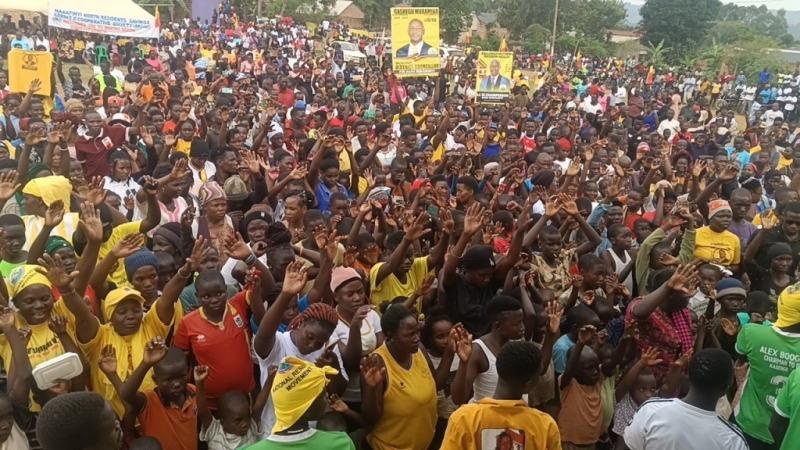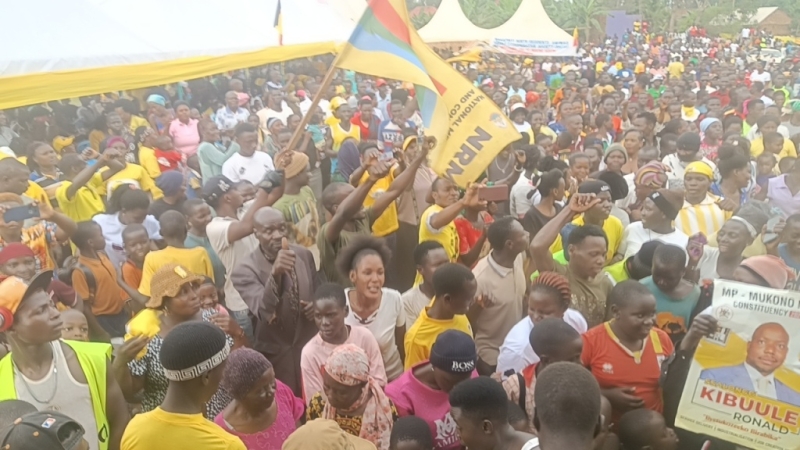A show of unusual political and economic alliance played out in Kasenge Parish, Mukono District, when Chinese and local investors physically escorted former State Minister Ronald Kibuule to one of his campaign rallies, signalling what they described as a critical vote for “industrial harmony” in the rapidly expanding Mbalala industrial belt.
Kasenge Parish—home to hundreds of workers employed in industrial parks, factories, and large-scale sugarcane plantations—became the backdrop for a campaign moment that blended labour concerns, investor expectations, and community frustrations.

The investors who walked alongside Kibuule said returning him to Parliament would restore a “working bridge” between factory owners and workers, praising him for previously pushing for better labour conditions in Mbalala Industrial Park.
They credited him for mediating disputes, ensuring fair treatment of workers, and fostering an environment that attracts foreign and local investment.
Some said the sector had been “slowed down” by leadership gaps since he left Parliament.
Kibuule, echoing their concerns, announced plans to form a joint investor–worker grievance committee, arguing it would offer a structured way to resolve disputes that often lead to abrupt dismissals, strikes, and high labour turnover.
“This committee will ensure that both the investor and the worker benefit,” he said.
Workers who attended the rally voiced long-standing complaints about low pay, which they linked to inadequate skills training.
Kibuule pledged to lobby for the construction of a vocational skills centre in Mbalala, tailored to industrial jobs.
“Factories demand skilled labour. When workers are properly trained, they can negotiate for better pay,” he told the crowd. “A skilling centre is the only sustainable way to uplift household incomes.”
Looking beyond factory matters, Kibuule laid out plans to boost local trade and improve public services.
He vowed to push for the construction of a modern market at Mbalala, saying it would improve safety for women currently selling along the busy Kampala–Jinja Highway.
He also reignited a dormant promise of a Health Centre IV for Mbalala, claiming President Museveni had already committed land for the facility, but the current area MP failed to follow up.
He said the health facility would be essential for responding to industrial accidents and community emergencies.
Residents of Kasenge, however, used the rally to air their frustrations, particularly over water shortages.
They claimed piped water extensions halted during Kibuule’s earlier tenure and have never resumed, worsening scarcity in the parish.
They also raised concerns over a dilapidated road leading to Victorious School, which they said is now riddled with potholes and nearly impassable.
The rally was capped with a prayer from Sheikh Mujjumba, who praised Kibuule as a “down-to-earth leader who protects ordinary people.”
In a dramatic invocation, the cleric urged divine punishment on anyone “standing in the way of his return.”
His remarks drew mixed reactions—cheers from supporters and murmurs from those concerned about the harsh tone of the blessing.

A Campaign Built on Labour Politics and Lost Promises
Kibuule’s campaign narrative in Kasenge illustrates a strategic shift toward labour-focused politics, leveraging the grievances of industrial workers and the influence of factory investors.
By aligning himself with investors while promising protections for workers, he is positioning himself as a mediator in an area where labour tensions are rising.
His promises—skilling centres, improved health infrastructure, and market development—speak to longstanding socio-economic gaps that industrialisation alone has not resolved.
But unresolved community concerns, especially on water access and poor roads, highlight the political liabilities he carries from previous terms.
Whether the endorsements of investors and religious leaders will outweigh these grievances remains to be seen.













